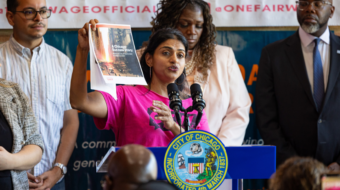
Polls show Hillary Clinton opening a fairly comfortable lead over Donald Trump in the Commonwealth of Virginia’s presidential race. There is more to be decided in the “Old Dominion” this November, though, including House seats and an important citizen referendum.
After the revelations last week of Trump’s ghastly comments about women, Clinton, whose lead had been small but constant in voter intention polls here, appears to be opening up a more substantial lead, of an average of 9 percent from several polls at this writing. Virginia is an important state, with 13 electoral votes (one each for its 11 House districts and for its two senators). It has also been a swing state, going for Obama in the last two presidential elections, but tending to move into the Republican column in state elections in between the federal elections for president. As in other parts of the country, the difference is generally attributed to the level of turnout in the Democratic Party’s base. The Democrats are cautiously optimistic that the controversy surrounding Donald Trump may generate a relatively high turnout for the Democrats this year.
There is no election for Senate this year, just for the House of Representatives and some local offices. But if Hillary Clinton wins the presidency, Tim Kaine, one of Virginia’s two Democratic senators, will have to be replaced. So far, U.S. Representative Bobby Scott (D-VA) is the individual most often mentioned for this Senate seat. (He would join Sens. Cory Booker (D-NJ) and Tim Scott (R-SC) to become one of just three African American senators if that happens.)
Some of the Republican candidates for house seats, both incumbents and challengers, are now moving to distance themselves from their party’s foul mouthed presidential candidate. Whether this will cause any surprise upsets in the House elections is yet to be seen. The Republicans have been trying to bolster their chances, which are threatened, in the long run, by demographic changes (more minorities and more people not born in Virginia). The techniques the Republicans have used for this include gerrymandering and voter suppression.
Virginia enacted a voter ID law in 2012; this is now being challenged in the courts by the Democratic Party. Another technique they are using to suppress the Democratic vote is to try to block Gov. Terry McAuliffe’s effort to restore voting rights to some 200,000 former felons. (After a setback in the courts, McAuliffe is now restoring the voting rights one person at a time, to howls of protest from the GOP.) Gerrymandering has not worked for them at the federal level, as a plan to change the boundaries of congressional districts in Southeastern part of Virginia has now received court approval. This plan redesigns Virginia’s Third and Fourth Congressional Districts in such a way as to make it almost certain the Fourth District will pass from the hands of the Republicans to the Democrats, changing the state House delegation from eight Republicans and three Democrats to seven Republicans and four Democrats. The incumbent Republican Congressman, a gay bashing extremist named Randy Forbes, decided not to contest the seat and tried to run in another district but was defeated in the primary. The Democratic candidate is A. Donald McEachin, an African-American state senator. The Republican candidate is Mike Wade, the Sheriff of Henrico County, which includes part of the region of Virginia’s capital, Richmond. Part of the reason that the redistricting is seen as good for the Democrats is that it moved more African-Americans into the Fourth from the neighboring Third District. Perhaps recognizing the realities of the new district’s demographics, the Republican candidate has opted not to align himself with Trump’s extremism.
The authoritative Cook Political Report rates the 4th District election as solid for the Democrats. A more distant possibility for the Democrats is the 10th Congressional District, which includes Washington D.C. exurbs on the state’s Northern border with Maryland. This is a wealthy and conservative area but its demographics are also changing. The Democrats, therefore, think they might have a chance of unseating freshman Republican Representative Barbara Comstock. The Democratic candidate is LouAnn Bennett, a real estate businesswoman. As a member of the House of Delegates, the lower house of the Virginia General Assembly, Comstock pretty much took hard right positions, but now she appears to be doing what she can to distance herself from Trump and his extremism. Bennett, of course, is not going to let her slip off that nasty hook, and raises the Trump issue whenever she can. The Cook report rates the race as “lean Republican”, which means that there is a chance the seat could flip to the Democrats. Whether the current uproar about Trump will make that change possible remains to be seen, with less than a month to go until the elections.
A longer shot for the Democrats is the Fifth Congressional District on Virginia’s border with North Carolina. This district includes the city of Danville whose population is evenly split between African-Americans and whites. The district overall has elected Republicans in recent years (but a centrist Democrat, Tom Pierello, did win the seat in the 2008 elections when the Obama election produced a big turnout of the Democratic base). The incumbent congressman, Republican Robert Hurt, announced earlier this year that he would not run for re-election, leaving the seat open. The Democratic candidate is Jane Dittmar, a member of the Albemarle County Board of Supervisors. The Republican is State Senator Tom Garrett, a former prosecutor. His platform is hard-line right wing, echoing the anti-immigrant emphasis of Donald Trump. He also calls for tax cuts, cuts in future Social Security and Medicare payments, gun rights as pushed by the NRA and a rollback of environmental restrictions. He also takes a hard line on abortion. Dittmar, like other Democratic candidates nationwide, is working to connect Republican Garrett with Trump in the minds of voters. The Cook Report rates this race as “likely Republican” which means that a win for Ditmar is really a long shot though not completely impossible.
There is an important referendum item on the Virginia ballot also, placed there by the Republicans at the behest of big business interests. If it succeeds, it would enshrine Virginia’s “right to work” law in the state Constitution. “Right to work” is currently statute law in Virginia, which means it could be repealed by the General Assembly at some point in the future. But to make it part of the state Constitution would make this process much more complicated, as it would require another constitutional amendment to repeal it.
Virginia has one of the lowest percentages of union membership of the 50 states. As of the year 2015, only 5.4 percent of Virginia workers belonged to a labor union, and 6.9 percent enjoyed union representation without necessarily being members. Only six other states have lower levels of union membership: Arizona, Arkansas, Georgia, North Carolina, South Carolina, Texas and Utah (Mississippi, North Dakota and Tennessee are tied with Virginia in this respect). Republican politicians, and even some Democrats, have supported “right to work” alleging that it is the reason for Virginia’s prosperity. Others question this, and organized labor in Virginia is organizing hard to defeat this referendum item. Media in Virginia have not been covering the issue very much.
If organized labor in Virginia could be significantly strengthened it would have an impact far beyond workplace issues of pay, benefits, hours and working conditions. A stronger labor presence in the state’s body politic could bring improvements in health care, schools, minority and women’s rights and many other things. The national trend has also been in the direction of more states adopting “right to work”, and a sharp check to this campaign in Virginia might have salutary repercussions beyond the state’s borders. For this reason, the Virginia AFL-CIO has made this a priority campaign issue.
Voter registration ends October 17 in Virginia, and all Virginians are urged to check their registration plus the voter ID requirements online.










